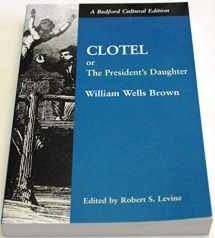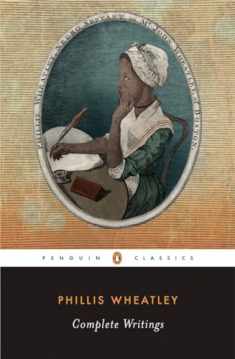
Clotel: Or, The President's Daughter: A Narrative of Slave Life in the United States (Bedford Cultural Editions)
ISBN-13:
9780312152659
ISBN-10:
0312152655
Edition:
First Edition
Author:
Robert Levine, William Wells Wells Brown
Publication date:
2000
Publisher:
Bedford/St. Martin's
Format:
Paperback
527 pages
FREE US shipping
on ALL non-marketplace orders
Marketplace
from $7.00
USD
Marketplace offers
Seller
Condition
Note
Seller
Condition
Used - Like New
A sharp academic trade paper, clean with a tight binding with an unmarked text.From a private smoke free collection.Shipping within 24 hours a tracking number and delivery confirmation.
Seller
Condition
Used - Good
Solid copy with no writing or marks to text. A few pages have small corner creases. Cover has mild wear to surface and corner tips. Binding tight and square; no creases to spine.
Book details
ISBN-13:
9780312152659
ISBN-10:
0312152655
Edition:
First Edition
Author:
Robert Levine, William Wells Wells Brown
Publication date:
2000
Publisher:
Bedford/St. Martin's
Format:
Paperback
527 pages
Summary
Clotel: Or, The President's Daughter: A Narrative of Slave Life in the United States (Bedford Cultural Editions) (ISBN-13: 9780312152659 and ISBN-10: 0312152655), written by authors
Robert Levine, William Wells Wells Brown, was published by Bedford/St. Martin's in 2000.
With an overall rating of 3.9 stars, it's a notable title among other
books. You can easily purchase or rent Clotel: Or, The President's Daughter: A Narrative of Slave Life in the United States (Bedford Cultural Editions) (Paperback) from BooksRun,
along with many other new and used
books
and textbooks.
And, if you're looking to sell your copy, our current buyback offer is $0.58.
Description
William Wells Brown’s Clotel (1853), the first novel written by an African American, was published in London while Brown was still legally regarded as "property" within the borders of the United States. The novel was inspired by the story of Thomas Jefferson’s purported sexual relationship with his slave Sally Hemings. Brown fictionalizes the stories of Jefferson’s mistress, daughters, and granddaughters — all of whom are slaves — in order to demythologize the dominant U.S. cultural narrative celebrating Jefferson’s America as a nation of freedom and equality for all. The documents in this edition include excerpts from Brown’s sources for the novel — fiction, political essays, sermons, and presidential proclamations; selections that illuminate the range of contemporary attitudes concerning race, slavery, and prejudice; and pieces that advocate various methods of resistance and reform.


We would LOVE it if you could help us and other readers by reviewing the book
Book review

Congratulations! We have received your book review.
{user}
{createdAt}
by {truncated_author}



